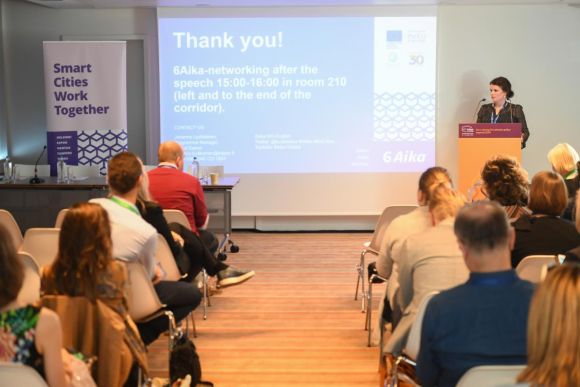
According to the French sociologist Emil Durkheim, the city is the place where the relationships are weaker and where anonymity can develop.
To combat this, urbanists try to create new spaces of socialization, but how to create strong links between inhabitants? How to empower them to create more opportunities? The smart cities could be the solution: a place to develop business and make citizens happier.
Six cities in Finland try to meet the challenge and want to export their model throughout the European Union. Johanna Lyytikäinen works as a programme manager for the city of Espoo in Finland, one of the six smart cities of the country. She was in Brussels for the European Week of Regions and Cities to present what she does every day in her city.
Espoo is the second biggest city in Finland with more than 250,000 inhabitants. Connecting people in a city five times bigger than Paris is very challenging, but she thinks she has the solution. In one word: cooperation.
A new project for working together as equal
The six biggest cities of Finland (Helsinki, Espoo, Vantaa, Tampere, Turku, and Oulu) —which represent almost 30% of the population— decided to work together to make cities more dynamic and more livable for inhabitants and companies. With a budget of one hundred millions euros, "we can change the world together", declared Ms. Lyytikäinen. And she is sure that this change will pass through the cities.
The novelty is the focus on "how we do things" rather than "what we can do", and the six cities work together every day for that.
Within the city, 6Aika brings together all the actors concerned by the domain and treat them as equal: companies, city, customers, patients, neighbors, parents, universities… in order to find the perfect solution for all.
For example, concerning the problem of transportation in Espoo, it has been decided the Sohjoa robot buses project, launched two years ago. It's a project of more than a half million euros to develop a new way of mobility.
"It's a win-win situation for customers and companies," said merrily Ms. Lyytikäinen, and it's also a win for universities that helped in the project and for the environment because all the buses are electric.
The human being: the center of all for developing new businesses
The cooperation between all the actors "empowers the citizens," according to Lyytikäinen: "We don't just ask them what they want, they participate", she added. The citizen is central in the process of the decision —or more precisely, the process of co-creation—.
Thanks to online Open Innovation Platforms and different meetings, inhabitants can decide for themselves and present their own ideas for a better life together. The city is not anymore the place of anonymity, but a place of exchange and discussion, like Habermas described it in « The Structural Transformation of the Public Sphere (1962).
The main goals of that project are very clear: it's not to "empower the citizen", but develop "new business, know-how and jobs" to "increase the national competitiveness".
Not like Aristotle wrote it "happiness is the meaning and the purpose of life, the whole aim, and end of human existence", jobs and competitiveness are the real final purposes for the 6Aika project.
Lyytikäinen said it very clearly: "The key question is how do grow in a substantial way", in a way that can also respect the environment and the inhabitants, because as the saying goes, a happy citizen is a future customer. And all that is good for the city.
By Amaury Bisiaux (France)



